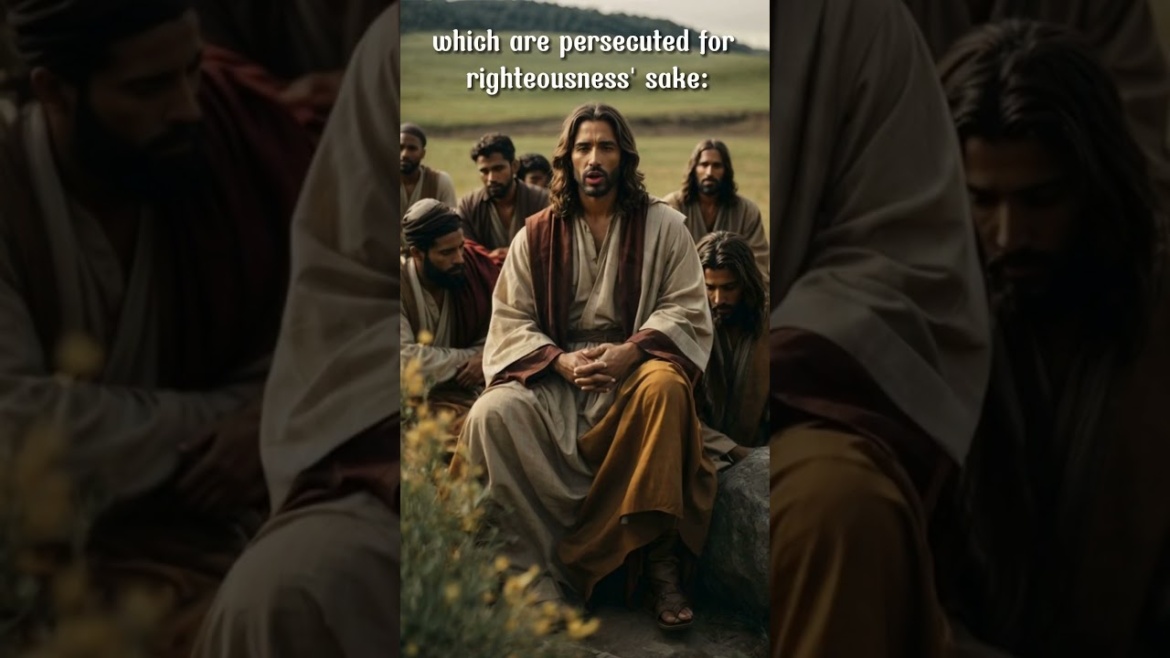The Significance of “Blessed are they which are persecuted for righteousness’ sake: for theirs is the kingdom of heaven.”
The phrase “Blessed are they which are persecuted for righteousness’ sake: for theirs is the kingdom of heaven.” is a profound spiritual beatitude used by Jesus in Matthew 5:10 from the Sermon on the Mount, is one of the most famous and challenging teachings of Jesus.
Context of the Phrase
The beatitude appears within Jesus’ Sermon on the Mount, a collection of teachings focusing on right living and morality for spreading God’s message. The Beatitudes were spoken to a group of people who were living under Roman occupation. The Romans were a powerful and oppressive empire. They were not afraid to use violence and intimidation to maintain control. The people of Israel were often persecuted for their faith. They were ridiculed, harassed, and even killed.
In this context, Jesus’ words were a message of hope. He was saying that even in the midst of suffering, there is reason for joy. The phrase “Blessed are they which are persecuted for righteousness’ sake: for theirs is the kingdom of heaven.” in Matthew 5:10 is about those who are persecuted for righteousness’ sake are blessed because they will inherit the kingdom of heaven.
Significance of the Phrase
The beatitude “Blessed are they which are persecuted for righteousness’ sake: for theirs is the kingdom of heaven.” is significant because it challenges our assumptions about what it means to be blessed. We often think of blessings as things that bring us comfort and happiness. But Jesus is saying that true blessing comes from suffering for righteousness’ sake.
This beatitude is also significant because it reminds us of the cost of discipleship. Jesus himself was persecuted for his righteousness, and he warned his disciples that they would also be persecuted.
Application of the Phrase
The beatitude “Blessed are they which are persecuted for righteousness’ sake: for theirs is the kingdom of heaven.” has been applied in various ways throughout history and across different cultures. Here are some examples of its application in various contexts:
Individual Application:
Understanding the nature of Christian life: It highlights the paradoxical nature of Christian life, where those who live righteously may face opposition and challenges. It reminds individuals that true happiness and fulfillment come from living according to God’s standards, regardless of external circumstances.
Call to live righteously: It challenges individuals to examine their own lives and ensure that they are living in a way that is consistent with God’s righteousness. It calls for courage and conviction in the face of societal pressures and temptations.
Encouragement in times of persecution: It has been a source of comfort and encouragement to countless Christians who have faced persecution for their faith. It reminds them that their suffering is not in vain and that they are partaking in the same experience as Jesus and the early Christians.
Social Application:
Advocacy for religious freedom: It has been used as a basis for advocating for religious freedom and tolerance in societies where Christians or other religious minorities face persecution. It emphasizes the inherent right of individuals to practice their faith without fear of discrimination or violence.
Challenging injustice and oppression: It has been invoked by those who stand up against injustice and oppression, even if it means facing personal risk or hardship. It reminds individuals of the importance of speaking truth to power and defending the rights of the marginalized.
Promoting peace and reconciliation: It can be applied to efforts of promoting peace and reconciliation in societies that have experienced conflict or division. It calls for forgiveness, compassion, and a willingness to seek common ground, even with those who have caused harm.
Cultural Application:
Literature arts: It has inspired numerous works of art, literature, and music, often exploring themes of faith, persecution, and resilience. It has served as a powerful reminder of the enduring strength of the human spirit and the hope that comes from faith.
Struggle movements: It has been echoed in various struggle movements throughout history, where individuals and groups have stood up for justice, equality, and human rights. It has served as a rallying cry and a reminder of the importance of fighting for a better world.
Global missions: It has motivated Christians to engage in global missions, to reach out to those who are persecuted or marginalized. It has inspired efforts to share the message of hope and love found in the Gospel of Jesus Christ.
THE CHILD IS INTENDED INTO ONE SUB & FOURTEEN GATES
« Samsara Gate Of Heaven In Child Intended To Exist »
What is 👁️ Third Eye? It is just Gate!
« Gate’s Beatitude »













